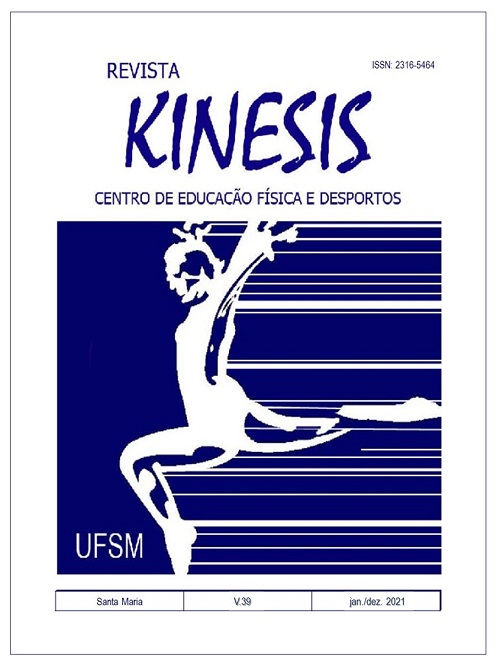Parkour: an analytics for Physical Education in the light of Motor Praxiology
DOI:
https://doi.org/10.5902/2316546444425Keywords:
Parkour, Internal logic, Physical EducationAbstract
The aim of the study is to analyze the elements of the internal logic of parkour to the Physical Education field, based on Motor Praxiology. The investigation is theoretical and descriptive, with a qualitative approach to the data. The theory of motor action was used to analyze parkour body practice, based on its main characteristics and singularities in the search for a better understanding of its internal logic. We believe that parkour assumes an important role in Physical Education with regard to its challenging and autonomous uniqueness in the body treatment and in the occupation of spaces, generating experiences and learning in the different paths and environments experienced in psychomotor, co-motor, and uncertain situations regarding the environment. Concomitantly, Motor Praxiology advances in the perspective of seeking new and important possibilities for creations and motor experiences for Physical Education field.Downloads
References
ALVES, M.A.C. A prática do Parkour como meio de desenvolvimento de força em membros inferiores e superiores no âmbito escolar. Revista Científica Multidisciplinar Núcleo do Conhecimento, Ano 2, v.01,p.483-487, abril de 2017.Disponível em: https://www.webartigos.com/storage/app/uploads/public/588/4ce/934/5884ce9347c95159950514.pdf
ALVES, C.S.R; CORSINO, L.N. O Parkour como possibilidade para a Educação Física escolar. Motrivivência, n. 41, p. 247-257, dez/2013.Disponível em:https://periodicos.ufsc.br/index.php/motrivivencia/article/view/2175-8042.2013v25n41p247
ANGEL, J. M. CinéParkour: a cinematic and theoretical contribution to the understanding of the pratice of parkour. Tese de Doutorado. Brunel University School of Arts PHD Theses, 2011.Disponível em:https://www.semanticscholar.org/paper/Cin%C3%A9-Parkour%3A-a-cinematic-and-theoretical-to-the-of-Angel/72f8b08356e73fee83f7daaace95127cd2e0c9bf
BORTOLETO, M.A.C. A ginástica artística estudada a partir da ótica da praxiologia motriz: reflexões preliminares. In: RIBAS, J.F.M. (Org.). Jogos e esportes: fundamentos e reflexões da Praxiologia Motriz. Santa Maria: Editora UFSM, 2008.
CARVALHO, R.G; PEREIRA, A.L. Percursos alternativos – o parkour enquanto fenômeno (sub) cultural. Revista Portuguesa Ciências do Desporto, v.8, n.3, p.427-440, 2008.Disponível em:http://www.scielo.mec.pt/scielo.php?script=sci_arttext&pid=S1645-05232008000300012
CHAGAS, R.R; ROJO, J.R; GIRARDI, V.L. O processo de esportivização de uma modalidade: o parkour enquanto prática espetacularizada. The jornal of the Latin American Socio-cultural Studies of Sport, Curitiba, v.5, n.1, p.21-33, 2015.Disponívelem:https://revistas.ufpr.br/alesde/article/view/42368
FAGUNDES, F.M; FOLLMAN, N; WENZEL, V.I. Como identificar a lógica interna das práticas motrizes de interação? Uma proposta de ferramenta da análise a partir da praxiologia motriz. Revista Kinesis, Santa Maria, v.37, p.01-15, 2019. Disponível em:https://periodicos.ufsm.br/kinesis/article/view/36035
FREITAS, V. Usos da cidade: parkour e b.boyng. Revista Ciêntífica/FAP, Curitiba, v.11, p.79-95, julho/dezembro, 2014.Disponível em:http://periodicos.unespar.edu.br/index.php/revistacientifica/article/view/1374
LAVEGA, P. Classificação dos jogos, esportes e as práticas motrizes. In: RIBAS, J.F.M. (Org.). Jogos e esportes: fundamentos e reflexões da Praxiologia Motriz. Santa Maria: Editora UFSM, 2008.
OLIVEIRA, M.M. Como fazer pesquisa qualitativa?.7ª edição revista e atualizada. Petropólis: RJ, Vozes, 2016.
PARLEBAS, P. Prefácio. In: RIBAS, J.F.M. (Org.) Praxiologia Motriz na América Latina: aportes para a didática na Educação Física. Ijuí: Editora Unijuí, 2017.
PARLEBAS, P. Prefácio. In: MARIN, E.C; RIBAS, J.F.M. (Orgs.). Jogo tradicional e cultura. Santa Maria: Editora UFSM, 2013.
PARLEBAS, P. Juegos, deporte y sociedad: léxico de praxiologia motriz. Barcelona: Paidotribo, 2001.
PEREIRA, D.W; HONORATO, T; AURICCHIO, J.R. Parkour: do princípio filosófico ao fim competitivo. Licere, Belo Horizonte, v.23, n.1, março de 2020.Disponível em:https://www.researchgate.net/publication/340244059_Parkour_Do_Principio_Filosofico_ao_Fim_Competitivo
RIBAS, J.F.M. (Org.) Praxiologia Motriz na América Latina: aportes para a didática na Educação Física. Ijuí: Editora Unijuí, 2017.
RIBAS, J.F.M. (Org.) Praxiologia Motriz e voleibol: elementos para o trabalho pedagógico. Ijuí: Editora Unijuí, 2014.
SARAVÍ, J.R. Prácticas corporales urbanas y praxiologia motriz: uma experiência pedagógica em taller. Cadernos de Formação RBCE, p.94-102, março de 2017.Disponível em:http://revista.cbce.org.br/index.php/cadernos/article/view/2259/1220
SARAVÍ, J.R. Skate enelGran La Plata : Lógica interna, lógica externa y Educación Física (Tesis doctoral). --Universidad Nacional de La Plata. Facultad de Humanidades y Ciencias de la Educación, 2019. Disponível em:https://www.researchgate.net/publication/340511109_Skate_en_el_Gran_La_Plata_Logica_interna_logica_externa_y_Educacion_Fisica
SARAVÍ, J.R.;BORDES, P. Prácticascorporales urbanas: deportes institucionalizados o prácticas lúdicas? Revista Acción Motriz, v.17, p.62-70, 2016.Disponível em: https://www.researchgate.net/publication/308794037_Practicas_corporales_urbanas_Deportes_institucionalizados_o_practicas_ludicas_Corporal_urban_practices_Institutionalized_sports_or_recreational_practices
STRAMANDINOLI, A.L.M; REMONTE,J.G; MARCHETTI, P.H. Parkour: história e conceitos da modalidade. Revista Mackenzie de Educação Física e Esporte, v.11, n.2, p.13-25, 2012. Disponível em: http://editorarevistas.mackenzie.br/index.php/remef/article/view/4037
VILALTA, J.M. Praxiologia motriz e as atividades na natureza. In: RIBAS, J.F.M. (Org.). Jogos e esportes: fundamentos e reflexões da Praxiologia Motriz. Santa Maria: Editora UFSM, 2008.
Downloads
Published
How to Cite
Issue
Section
License
The works must be submitted in the digital format of the SEER platform, via the electronic address: http://periodicos.ufsm.br/kinesis/index. In case of any doubts, contact the editorial team through the email kinesisrevista@ufsm.br. The authorship that publishes in the Kinesis journal agrees to the following terms:
- They retain copyright and grant the journal the right of first publication.
- They allow and are encouraged to publish and disseminate their work online (e.g., in institutional repositories or on their personal page) as this can cause positive alterations, as well as increase the impact and quotation of the published work.







